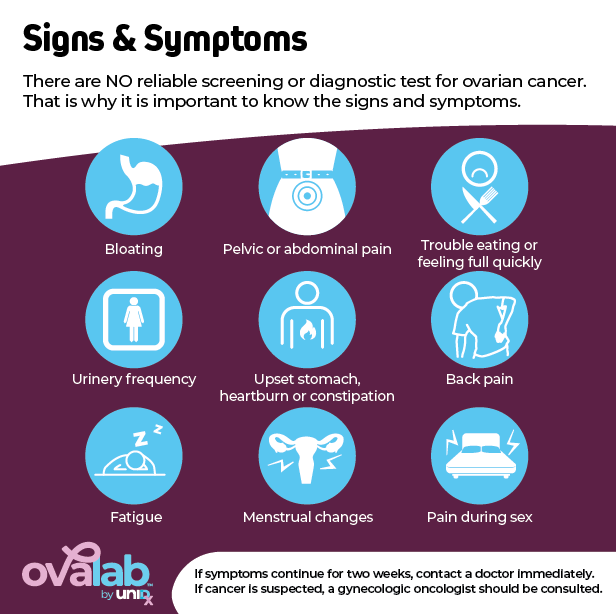Early ovarian cancer symptoms
Ovarian cancer often goes undiagnosed or misdiagnosed in the early stages.
Finding and treating ovary cancer early increases the chances of survival.
In the past, it was thought that it didn’t have symptoms until the late stages of the disease. But women who have had ovarian cancer felt that they knew something was wrong long before doctors found their cancer.
Common symptoms of ovarian cancer
Ovarian cancer does have symptoms, but they are very subtle, easy to miss, and mistaken for other common problems.
Women sometimes ignore the early signs of ovarian cancer or think the symptoms are simply related to getting older, gaining weight, or other less serious problems.
If you have symptoms concerning for ovarian cancer, you should see your doctor for a physical exam, an ultrasound exam, and a blood test (CA125).

Studies show that ovarian cancer can produce these symptoms:
- Bloating
- Bloating is normal around your monthly cycle, but bloating that lasts every day for up to three weeks is not. Bloating with a visible swelling in your stomach can also be a sign
- Pelvic or abdominal pain
- Pressure in the abdomen, pelvis or lower back pain that doesn’t go away and lasts for one to three weeks
- Difficulty eating or feeling full quickly
- A loss of appetite is a common ovarian cancer symptom. Other symptoms are feeling full quickly and having trouble eating even small meals
- Urinary symptoms
- feeling pressure or pain in the bladder
- frequent urination
- a sudden, urgent need to urinate
People with ovarian cancer say that symptoms don’t go away and are a change from normal for their body. How many symptoms you have and how often you have them are key factors in diagnosing ovarian cancer.
Uncommon symptoms of ovarian cancer
Those with ovarian cancer have also reported these symptoms:
- Fatigue (Persistent tiredness that is new and doesn’t go away)
- Indigestion (pain or discomfort in the upper abdomen)
- Back pain (lower)
- Pain with intercourse (sex)
- Constipation (new constipation that is not relieved by any interventions)
- Menstrual irregularities (shorter, longer, missed, heavier, lighter)
- Unusual vaginal bleeding (especially after menopause)
- Weight loss (not explained)
While ovarian cancer symptoms can be vague, the key is paying attention to how long symptoms last. Ovarian cancer symptoms last for more than 1 to 3 weeks, don’t come and go, and over-the-counter medicines don’t help. If your symptoms last for more than two weeks and are new or unusual for you, see a gynecologist and ask about ovarian cancer.

